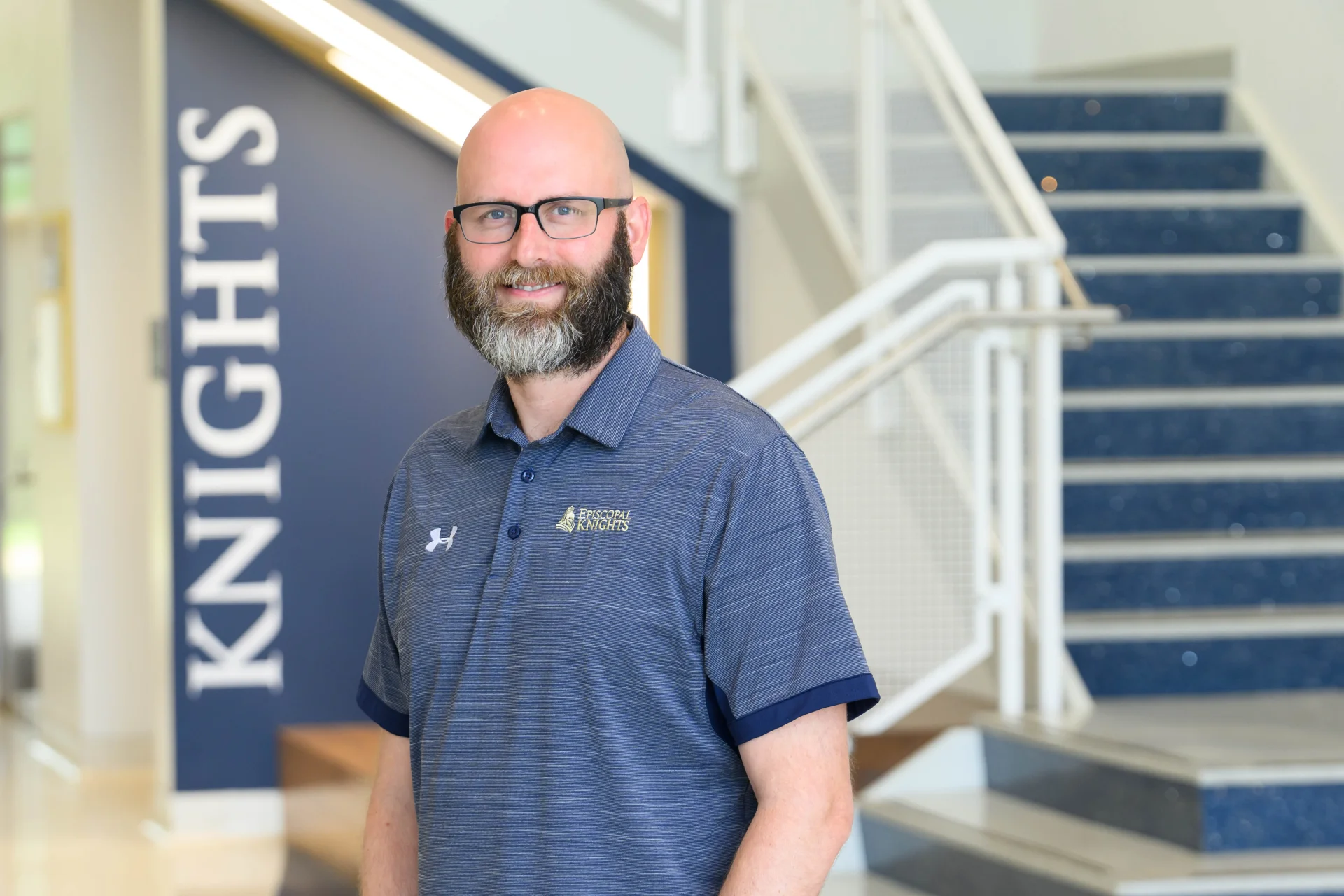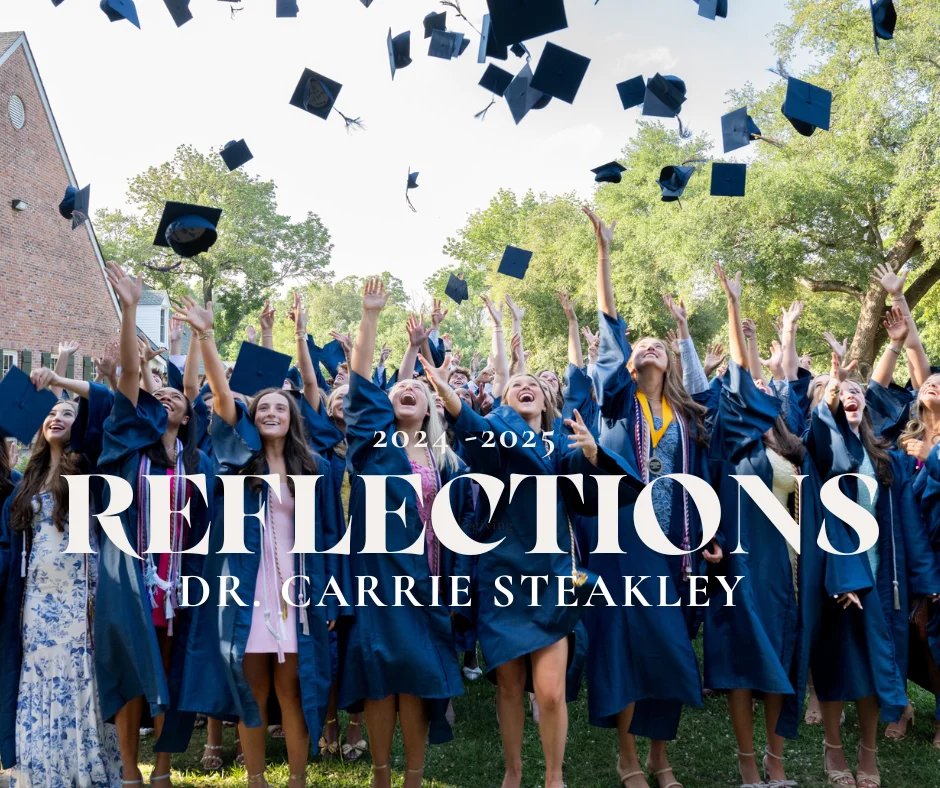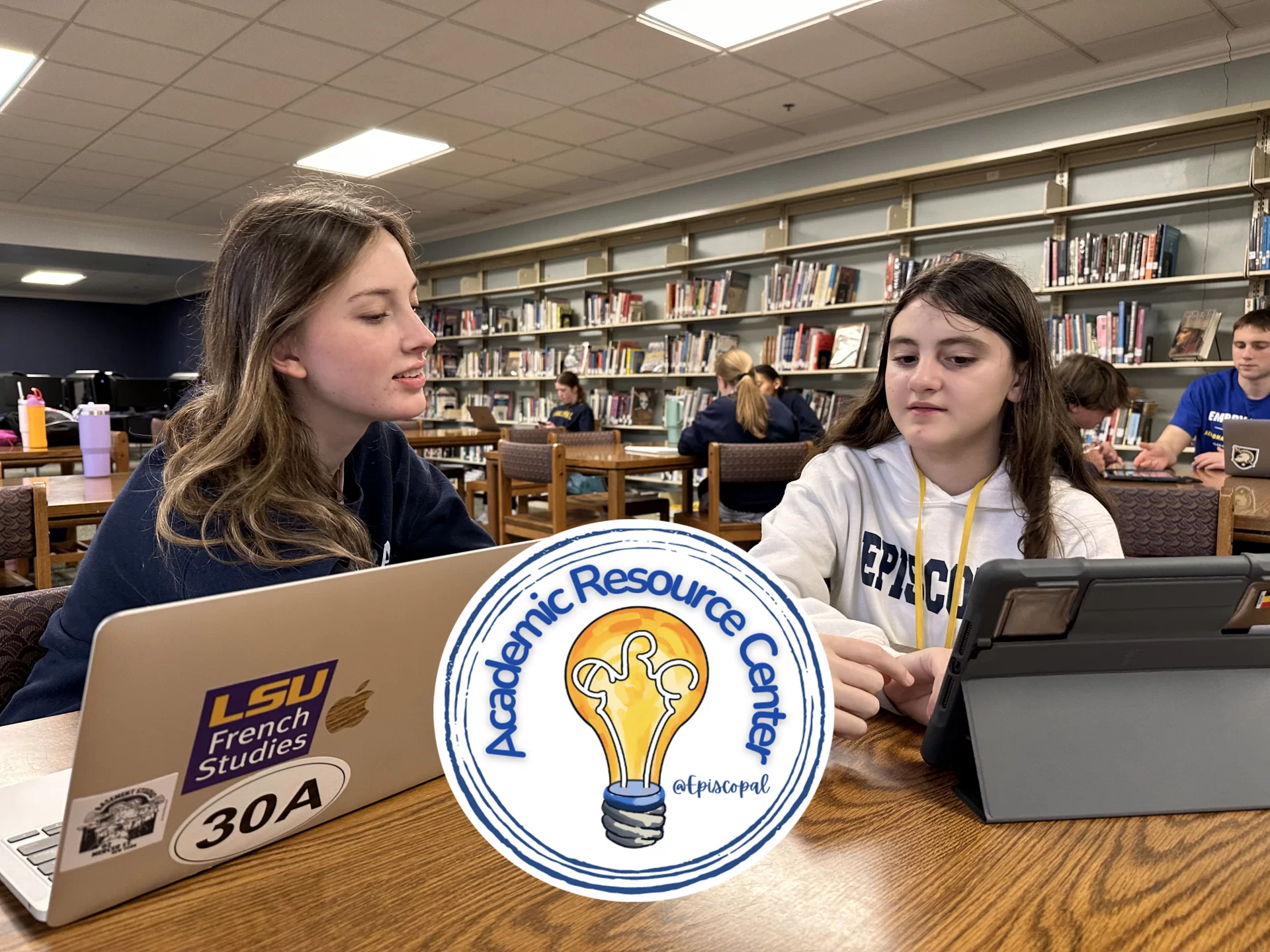- Admission
- Discover Episcopal
- Our Program
- Athletics
- Arts
- Spirituality
- Student Life
- Support Episcopal
- Alumni
- Parent Support
- Knightly News
- Contact Us
- Calendar
- School Store
- Lunch Menu
- Summer Camps
« Back
Long Live Office Hours!
August 25th, 2022

Earlier this month, we entered our first “normal” school year since the COVID pandemic upended all our routines for nearly two full years. Like bears emerging from hibernation, the transition back to old ways began slowly and cautiously. We started holding Upper School announcements with all students in the VPAC late last Spring. Prior to this August, the Class of 2024 had never experienced a chapel service packed with every teacher and student from the Upper School. Though students may not think about these things all that often, these gatherings create a sense of belonging and community.
Yet, even as lots of things returned to pre-pandemic norms around Episcopal, others did not. Many students no longer had the same sorts of interactions with their teachers outside of the classroom setting. That teacher-student bond exists at lots of schools across the country, to be sure. But one of the things that attracted me to Episcopal eight years ago when I was on the job market was how much faculty, coaches, and staff embraced being role models for young people as they transitioned to adulthood. Even more impressive: students expected to be mentored and given advice. Not just on how to pass the next chemistry quiz, but on what makes a good life or how they figure out their purpose.
When I was asked to re-frame this piece about office hours that I wrote for the Knightly News years ago, that last part is what stood out to me. The student in the picture, Alexander Harlan (Class of 2020), rarely came to office hours for help with History or Economics in the two years I taught him. However, we did talk a lot about the future. We discussed his sense that he wasn’t always sure what he wanted to do after his time at EHS. I believe he left those conversations feeling heard and mentored a bit. I think it helped hearing from someone who had had all those same questions 20 years before and could assure him that it would probably work out. And then, that spring, the world shut down.
This year, the Upper School administration decided it was time to breathe new life into office hours after the COVID times had seen it recede into the background. During the first quarter, all freshmen are required to visit one teacher or classroom after lunch to touch base with their teachers. I’ve offered my classroom up to my underclassmen quiz bowl players for mini-practice sessions if they are up to date in their coursework and their grades are fine. This small nudge has worked wonders the first full month of the 2022-2023 school year, in my opinion. The relationships are back. Students approach teachers for help with coursework. They also engage in fun, off-the-cuff conservations that were missing for the last two years. This week, we’ve all been talking about what we would do if we won the lottery! On a related note: they now know way more than any high school freshman or sophomore should about dividend growth stocks and municipal bond funds.
I’m glad that office hours are back and as robust as ever. I missed having 5-10 students in my classroom every day after lunch bringing energy and curiosity into the space. Does it improve grades and academic performance? Absolutely. More importantly, does it make this community vibrate with enthusiasm and a renewed sense of belonging? Without a doubt!
Long Live Office Hours!
Picture it. The year was 2012. The scene: a frigid March morning in Buffalo where the snow stood five feet deep on the sides of nearly every road in Western New York. Now three and a half months into a relentless gray winter broken only by the rhythmic cycle of lake effect snowstorms dropping 8-20 inches of the white flakes every week or so, a younger, slimmer version of me dragged himself out of bed to drive twenty minutes away to the University at Buffalo History Department to wait in a nondescript office for the next two hours. The ride in was cold. My car didn’t actually fully get toasty until I had entered the university parking lot. But I had an obligation to fulfill every Thursday between 8:30 and 10:30: office hours. Every week without fail, I showed up on my “off” day (which was usually also devoted to reading one entire book and writing a response paper for one of my three graduate courses) to make myself available to students who might have questions about how to succeed in their World Civilizations or U.S. History course.
 Sadly, ninety percent of those office hours were lonely. No students came. Usually, they only arrived after the midterm exam or paper when they had received a less-than-stellar grade. They wanted to know how to rectify the bad grade. I would give them advice on how to better take lecture or reading notes. Others wanted to know how to better structure their thoughts for an argumentative paper. After meeting with me (or any of my other fellow graduate teaching assistants) most students left feeling like college was not impossible. They left with a renewed belief in their own abilities as a student. They felt like somebody was invested -- even if only for one course -- in helping them succeed. The experience proved transformative for the handful of struggling, frustrated students who showed up.
Sadly, ninety percent of those office hours were lonely. No students came. Usually, they only arrived after the midterm exam or paper when they had received a less-than-stellar grade. They wanted to know how to rectify the bad grade. I would give them advice on how to better take lecture or reading notes. Others wanted to know how to better structure their thoughts for an argumentative paper. After meeting with me (or any of my other fellow graduate teaching assistants) most students left feeling like college was not impossible. They left with a renewed belief in their own abilities as a student. They felt like somebody was invested -- even if only for one course -- in helping them succeed. The experience proved transformative for the handful of struggling, frustrated students who showed up.
Unfortunately, the overwhelming majority of students did not even bother to do that: show up.
When I was hired at Episcopal, I decided to highlight the importance of showing up to office hours to all of my students. I argue that it is the single most underutilized aspect of their high school and college careers. Showing up to office hours even once a month for each class leads to a whole list of benefits for students. These include but are not limited to:
- Higher grades.
- Improved academic performance.
- Learning to effectively advocate for yourself as a student when you do not quite understand what is going on with a unit your studying in History. Or Math. Or English.
- Learning how to communicate with authority figures with respect, but without fear.
- Cultivating a relationship with someone who wants to mentor young people and who sees their potential for excellence even if they as students don’t recognize that greatness in themselves.
- Learning that asking for help is not a sign of weakness, but a sign of self-awareness and long-term strength.
- Building a strong reputation among faculty and staff as a serious, hard-working scholar.
- Giving the teachers who write their college recommendations something glowing to say about their work ethic and maturity.
If our students leave Episcopal and are comfortable approaching their college professors, managers, and bosses, they are more likely to succeed. In addition to getting higher grades, they turn their classroom experiences into early-career-defining moments. Last year, for example, an alum came back to campus and mentioned how stunned she was that so many of her college classmates did not take lectures and office hours seriously. She said that she sat in the front row for each class meeting, made sure to ask at least one meaningful content-related question per lecture, and went to office hours to meet with her professor for at least 10-15 minutes each week to clarify her own reading notes. Not only was the student regarded by the faculty in her department as a rock star by the end of her first semester of Freshman year, but she was also offered a paid summer internship by one of her professors because they recognized her potential. She is not the only one. I’ve lost count of how many students have gone on to serve on Capitol Hill, work for large non-profit organizations, and intern for large, impressive corporations during the summer.
The one thing most of them have in common? They went to office hours. Intentionally. Consistently. Doing so gave them a leg up on the students who had not. Professors would love to point serious students in the direction of opportunities that would turn their majors and minors into a career by the time they leave with a Bachelor’s degree in hand. While everyone else is avoiding office hours, I’m proud to hear that a good number of Episcopal alums who developed the habit of going to office hours to meet with instructors continue to show up.
The one thing most of them have in common? They went to office hours. Intentionally. Consistently. Doing so gave them a leg up on the students who had not. Professors would love to point serious students in the direction of opportunities that would turn their majors and minors into a career by the time they leave with a Bachelor’s degree in hand. While everyone else is avoiding office hours, I’m proud to hear that a good number of Episcopal alums who developed the habit of going to office hours to meet with instructors continue to show up.

Dr. Billy Pritchard
Dr. Billy Pritchard is a native of Winn Parish, Louisiana. He and his wife, Lisa, came to Episcopal in 2015 after spending the previous decade in Buffalo, New York. Dr. Pritchard is a 1999 graduate of the Louisiana School of Math, Science, and the Arts. In addition, he earned a bachelor’s degree from Centenary College of Louisiana, a master’s degree from Ole Miss and doctorate from SUNY-Buffalo. Dr. Pritchard teaches U.S. History, Honors AP U.S. History, American Presidency and the Civil Rights Movement.
The Episcopal School of Baton Rouge 2025-2026 application is now available! For more information on the application process, to schedule a tour, or learn more about the private school, contact us at [email protected] or 225-755-2685.
Posted in the categories All, Upper School.
Other articles to consider
 Jun5Episcopal Announces New Athletic Director
Jun5Episcopal Announces New Athletic DirectorPlease join us in welcoming Brent Broussard to the Episcopal community.
See Details Jun2Episcopal Welcomes Dan Binder as the Next Upper School Division Head
Jun2Episcopal Welcomes Dan Binder as the Next Upper School Division HeadPlease join us in welcoming Dan Binder to the Episcopal community.
See Details May22End of the Year Reflection from Dr. Steakley
May22End of the Year Reflection from Dr. SteakleyAn Episcopal education and the community that supports it are remarkable. Dr. Steakley looks back at the moments that made the 2024/2025 school year.
See Details May12Tutoring with a Purpose: Jackson Ezell Reflects on His Time in the Academic Resource Center
May12Tutoring with a Purpose: Jackson Ezell Reflects on His Time in the Academic Resource CenterTime as an ARC Fellow boosts student confidence, encourages friendships and fosters lifelong learning habits. Senior Jackson Ezell reflects on his transformation as a tutor and the transformation of the center from Writing Center to Academic Resource Center.
See Details
Categories
- All
- Admission
- Athletics
- College Bound 2019
- College Bound 2020
- College Bound 2021
- College Bound 2022
- College Bound 2023
- College Bound 2024
- College Bound 2025
- Counselors Corner
- Episcopal Alumni
- Giving
- Head Of School
- Lower School
- Middle School
- Spirituality And Service
- Student Work
- The Teachers' Lounge
- Upper School
- Visual And Performing Arts











